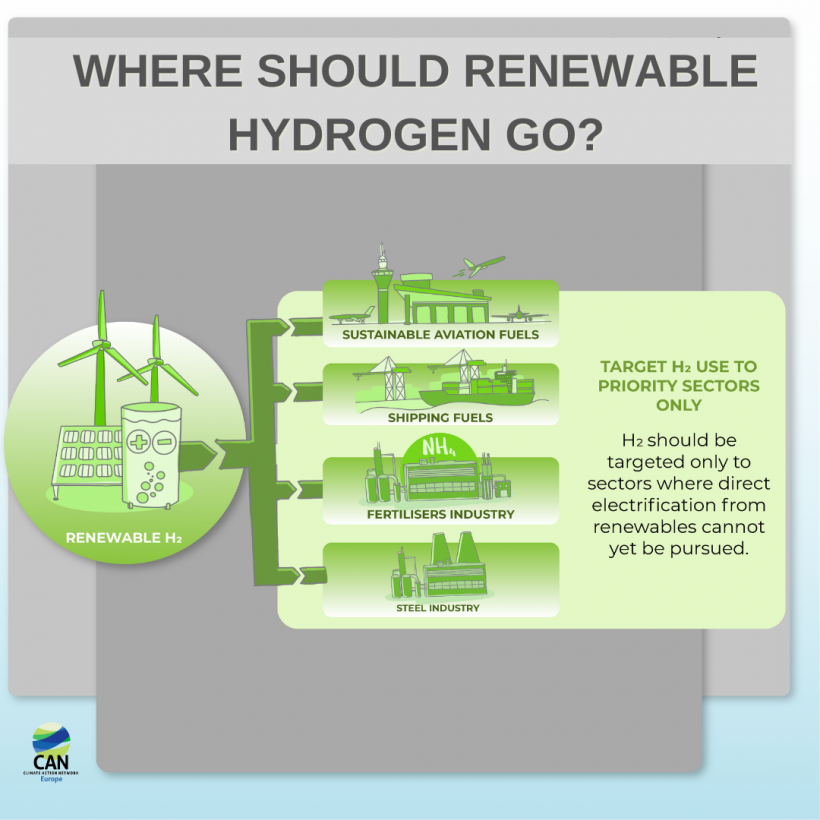- The EU will sign a MoU on renewable hydrogen with Egypt, while having already signed one with Namibia last week, and is about to sign one on hydrogen only with Japan.
- Until hydrogen is 100% renewable, it will continue being produced from fossil gas, worsening the energy and the climate crisis. Therefore significant additional renewable generation capacities need to be generated.
- Hydrogen MoUs need to be monitored carefully to exclude new gas exploration and infrastructure development.
Brussels / Sharm-El-Sheikh, 14 November 2022 – The European Union will sign a Memorandum of Understanding with Egypt, having already penned one deal with Namibia last week at Sharm El Sheikh (Egypt) during COP27, entailing agreements on renewable hydrogen. These short-sighted deals, which are part of the ‘REPowerEU’ that plans to import 10 million tonnes of renewable hydrogen by 2030 (in addition to producing 10 million domestically), fit in the larger EU strategy to move away from Russian fossil gas and fossil fuels in general.
The Memorandum of Understanding with Namibia covers raw materials and renewable hydrogen. The European Investment Bank (EIB) and Namibia also signed a joint declaration to deepen their cooperation on renewable energy, including renewable hydrogen, including a loan by EIB Global to the Government of Namibia of up to €500 million.
The MoU between the EU and Egypt focuses on accelerating cooperation on renewable hydrogen and its derivatives (ammonia, methanol, synthetic gases and synthetic fuels) produced with technologies such as “electrolysis”. The plans should complement existing energy cooperation between the EU and Egypt, including in the context of the East Mediterranean Gas Forum (EMGF). As the EGMF is involved and hydrogen expansion is the perfect catch for the fossil gas industry to continue business as usual (via pipeline and other infrastructure), the development of this MoU (and others focusing on hydrogen) needs to be monitored very carefully to exclude new gas exploration and infrastructure development.
The (Renewable) Hydrogen Controversy Hydrogen has been misleadingly considered as the new transition fuel as it is seen by many as a clean alternative to coal, fossil gas and oil. With Russia’s war in Ukraine and the subsequent fossil gas and energy crisis, the European Commission further pushed renewable hydrogen expansion as the magic wand to diversify away from Russian gas. However today hydrogen is produced predominantly from fossil gas as close to 100% comes from Steam Methane Reformation. But, for the use of hydrogen to deliver significant emissions savings, all of the energy used for hydrogen production must come from additional renewable energy sources, coming on top of those needed to electrify main sectors of the economy (heating, transport, industry).
Once produced, renewable hydrogen must be targeted only to those sectors where direct electrification through renewable energy cannot yet be pursued: energy intensive industries such as the steel and fertiliser industry, or long distance transport with shipping and aviation.

Renewable hydrogen is a scarce resource that can only play a genuine role in limiting temperature rise to 1.5°C if it is used in a very targeted manner.
To ensure that the EU gets on track with the energy transition the vast majority of renewable hydrogen should be produced in Europe domestically. If renewable hydrogen was to be imported to help the nascent renewable industry, this should only be the case if:
The exporting country has full energy access and support is provided to embark on the just energy transition
Additionality is guaranteed
Robust sustainability criteria and human rights safeguards are in place
Support to development objectives; capacity and skills-training; local communities are enabled to participate in decision-making and capture benefits from projects
“The gas panic shopping noticed ahead of the COP as well as the hydrogen hype during the climate summit leading the EU Commission president to sign on to various agreements with African countries is more than doubtful. It is questionable if Egypt has a genuine interest in renewable hydrogen or rather a hidden gas agenda, but also the EU risks expanding hydrogen imports beyond its real needs and mainly overruling the needs of exporting countries themselves which still need to embark on their energy transition,” said Esther Bollendorff, Gas Policy Expert at Climate Action Network Europe.
ENDS
Notes to the editor
CAN EUrope COP27 Media Briefing
CAN Europe’s Position Paper on Hydrogen
CAN Europe’s PAC Scenario
Explainer: How the EU and Europe must contribute to achieving a progressive COP27 outcome
Blog: The EU hunger for gas should not lock-in Africa in fossil-fuels
Memorandum of Understanding with Namibia
Civil society perspectives on Green Hydrogen production and Power-to-X products in Africa
CONTACTS:
Doruntina Basha, Communications Coordinator, CAN Europe, doruntina.basha@caneurope.org
Nina Tramullas, Interim Head of Communications, CAN Europe, nina.tramullas@caneurope.org (


